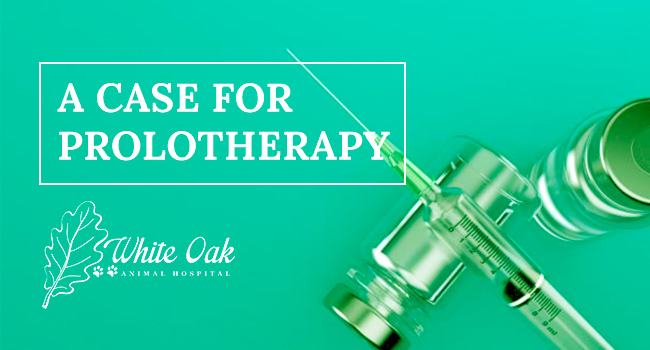
Will prolotherapy sessions help my pet?
Possibly! Prolotherapy sessions help many pets and take the place of invasive surgery. We find it especially helpful for pets with partial CCL tears.
Prolotherapy is just one of the many branches of alternative medicine, used in both humans and animals. You may also see it termed “proliferation therapy” or “regenerative injection therapy”.
The practice of prolotherapy dates way back to the 15th century B.C. with Hippocrates. Since then, it has been refined and proven itself true throughout the years. Prolotherapy entered the veterinary world in the 1970s.
The indications for prolotherapy include, but are not limited to:
- Ligament injury
- Degenerative joint disease
- Degenerative spinal arthritis
- Back pain
- Neck pain.
Since ligament injuries are one of the most commonly diagnosed orthopedic problems in dogs, especially large breeds, we’ll focus on ligaments in this article. Specifically, the cranial cruciate ligament (often referred to as the ACL in human medicine).
The most important thing to remember is prolotherapy is not the answer for every case. It’s important to have your veterinarian do a complete work-up on your pet, including a physical exam and possibly radiographs. If the ligament is already torn completely, surgery is a much better option.
How does prolotherapy work?
A mixture of substances is injected into the affected ligaments. This causes more blood to flow to the joint which results in inflammation. This causes the body’s natural healing process to turn on. As the new tissue is formed by the body, the pain is relieved.
Are prolotherapy sessions painful?
Prolotherapy causes mild to moderate pain. Sedation, and sometimes anesthesia, is necessary to perform the procedure properly and with minimal pain for your pet.
How long does it take?
The procedure takes approximately 30-45 minutes. Prolotherapy is an outpatient procedure. However, since sedation is necessary, your pet will need to spend the day with us.
How many treatments are necessary?
A minimum of three visits are necessary, but it varies from patient to patient. A physical exam of the joint will be done at each visit to check for progress.
Is it safe?
Although small, infection is a risk anytime you give an injection. Dr. Damron takes great care during the procedure to ensure everything is as sterile as possible. For precaution, we usually put our patients on a short course of antibiotics.
What about exercise?
Although sometimes challenging, it is necessary to keep your dog calm during therapy. Until the ligament is healed completely, the risk of tearing it through should be kept to a minimum. Leash walking may be necessary. Jumping up and down from furniture and excessive stair climbing are also discouraged. After several visits and treatment is complete, your pet may slowly return to normal activity.
Can I give my pet pain relievers to alleviate the pain?
No. The purpose of these prolotherapy sessions is to generate pain so the body will heal itself. Pain relievers block the body’s natural healing mechanisms from doing their job. Ice packs help alleviate pain and swelling.
Obesity often plays a role in CCL injuries. Weight loss is another great way to alleviate pain if your animal falls into this category.
Powerful Tools to Help Your Dog’s Ligament Challenges
You can make many quick and easy changes at home to help you give your dog an edge on easing tendon and ligament challenges.
- Learn more about torn ligaments and cruciate disease.
- Provide joint support. PET | TAO Harmonize Joint is a blend of Eastern herbs and Western supplements working together to lubricate and restore your dog’s joints.
- Ease your dog’s discomfort naturally. PET | TAO Comfort is a blend of Eastern herbs and Western supplements to soothe your dog’s arthritic challenges to make him/her more comfortable.
- Try PET | TAO Freeze Dried Beef Liver Treats. According to TCVM, liver controls tendons and ligaments. As few as 3-5 treats per day can make a huge difference in your dog’s tendon and ligament health!
- Try a Blood-building TCVM Diet. PET | TAO Zing Canned Formula builds Blood. According to TCVM, Blood deficiency leads to ligament tears.
- Learn more about TCVM Herbal Remedies. Chinese medicine offers many amazing natural solutions for ligament and cruciate challenges. Some good examples are: